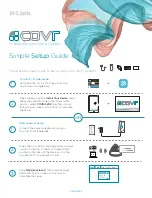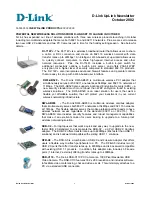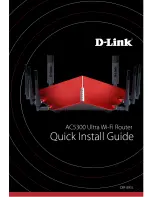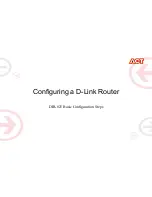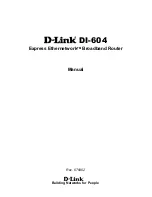
95
8. Q: Why can
’
t be the NTFS hard disk used with DN-11007-N?
A: DN-11007-N doesn
’
t support the NTFS hard disk. It only supports FAT16 and FAT32
hard disk.
9. Q: Why can
’
t my USB devices and LAN ports work properly after setting the DHCP?
A: There are two rules over here.
Rule1: After connecting USB devices, please reboot your Router.
Rule2: Before finishing the DHCP setup, please don
’
t connect any computer to LAN
ports, because the conflict of having the same IP may occur and cause
some computers a lot of trouble.
(Notice: Make sure that you always click the
Apply
key after configuring every
setting. And in order to let others LAN ports working properly, please reboot your
PC.)
10. Q: Why can
’
t my USB devices work on DN-11007-N?
A: Maybe your USB devices and DN-11007-N are not compatible. So if you want to
know whether your inserted device such as USB Web Camera, USB Printer or
USB HDD corresponds with DN-11007-N, please check with your product provider.
11. Q: Why can
’
t my computer work online after connecting to DN-11007-N?
A: It
’
s possible that your Internet protocol (TCP/IP) was set to
use the follow IP
address
. Please do as the following steps.
Start
>
Settings
>
Network and
Dial-up Connections
>
double click
Internet Protocol(TCP/IP)
>
select
obtain IP
address automatically
>
click
OK.
Then, open Internet browser for testing. If you
still can
’
t go online, please test something else below.
l
Verify network configuration by ensuring that there are no duplicate IP
addresses.
l
Power down the device in question and ping the assigned IP address of the
device. Ensure no other device responds to that address.
l
Check that the cables and connectors or use another LAN cable.
12. Q: I don
’
t know how to configure DHCP.
A: DHCP is commonly used in the large local network. It allows you to manage and
distribute IP addresses throughout your local network via DN-11007-N. Without
DHCP, you would have to configure each computer separately. It
’
s very troublesome.
13. Q: What for does DN-11007-N assign DNS addresses?
A: Multiple DNS addresses are useful to provide an alternative when one of the
servers is down or is encountering heavy traffic. ISP typically provides primary and
secondary DNS addresses, and may provide an additional address. Your LAN PCs























